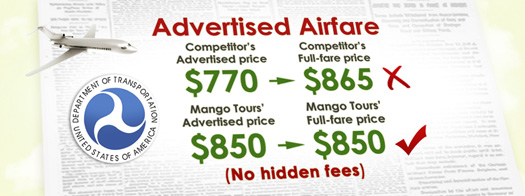
The Full Fare Advertising Rule was put in place by the federal government as a protection for consumers against misleading airfare advertisement. This rule stipulates that any carrier or ticketing agent that is promoting a price for airline tickets must disclose the full price. This means that all costs posted what the consumer will pay and nothing more. In essence, there should be no hidden fees. In the event where a customer is quoted a price that exceeds the advertised price, the agent or ticket seller is very likely in violation of the Full Fare Advertisement law.
Each state has implemented their own set of consumer protection laws, offering their residents protection against any form of deceptive advertising. The Airline Deregulation Act established in the USA in 1978 by the Supreme Court, however, preempted this airfare advertising law for airlines and travel agents. What this means, is that the federal government is solely left with the job of making sure people paying for airline tickets are getting what they pay for in accordance with the Full Fare Advertising Rule.
Deceptive And Unfair Practices and methods of competition
As it relates to air carriers, foreign air carriers or ticketing sales agents, if a complaint is made to the Secretary of Transportation, and it is considered by the Secretary to be in the interest of the public, an investigation may be carried out by the Secretary to determine whether an air carrier, ticketing sales agent or foreign air carrier is indeed carrying out Unfair and Deceptive practices or unfair methods of competition. If during the investigation it is determined that an air carrier, foreign air carrier or ticketing sales agent was in fact engaged in Unfair and deceptive practices and unfair methods of competition, a cease and desist order shall be given out to the relevant party.
Price Advertising.
Unless the prices stated by the airline directly or an indirect carrier or a travel agent, for air transportation, tours, accommodations, or a tour component, is stated in full and will be the actual price that the customer will pay, it is considered by the board to be unfair or deceptive practice.
The Full Fare Advertising Rule is investigated and enforced by theDepartment of Transportation, Office of Aviation Enforcement and Proceedings (http://airconsumer.ost.dot.gov).
Application of the Law:
The rule for Full Fare Advertising applies only to ads that quote a particular price for air tickets. This rule is also applicable for tour packages that are inclusive of airfare pricing.
The Full Fare Advertising applies to all the below forms of advertising:
1) All print ads, including brochures, flyers, newspaper or any other physical form of marketing.
2) Muti media ads, such as videos, radio or webcast.
3) Company websites.
4) Online advertisements, including search engine paid ads, online directory or social media.
Before 2012, the Department of Transportation permitted and imposed airfare taxes and fees to be shown separately for the advertised price. Since 2012, it is a requirement by the Department of Transportation that the tax and extra fees portion of the fare is included in the advertised price. Additionally, prices cannot be rounded down for airfare prices. The exact price has to show, or the prices have to be rounded up to the nearest dollar.
Imposed Penalties For Violation
The civil government can charge a maximum penalty of $27,500 per day for each day the violation is ongoing. The law has some small business exceptions included that can assist in the reduction of fines. However, most of those requirements are now out-dated by the modern approach to airfare marketing and advertisement. If violation persists for an extended period, it can result in fines amounting to hundreds of thousands and sometimes millions for the violator.
In most cases, the Department of Transportation has been lenient with reducing penalties for first time carriers and travel agents, in the hopes of bringing first-time violators of the Full Fare Advertisement rule up to compliance. However, repeat offenders will not be so lucky as the Department Of Transportation have been known to use these repeat violators to set an example for the travel industry.